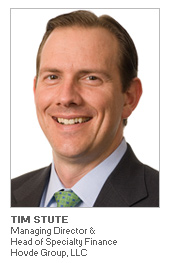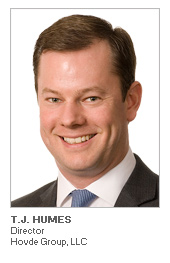
In October 2017, Hovde Group (Hovde) – an investment banking and advisory firm providing specialized mergers and acquisitions advisory, capital raising and equity research services to banks and thrifts across the United States – announced the formation of a new practice to advise specialty finance companies. The division will be led by Tim Stute, Managing Director and Head of Specialty Finance. Joining Stute in this new practice is his long-time colleague T.J. Humes as Director, as well as two other experienced colleagues.
Prior to joining Hovde, both Stute and Humes were with Houlihan Lokey’s Financial Institutions Group (and its predecessor – Milestone Advisors, which was acquired by Houlihan Lokey in 2012), where they were responsible for originating and executing M&A and capital markets engagements on behalf of a variety of commercial, consumer, mortgage, and small business finance companies and financial technology companies across the U.S.
ABL Advisor met with Stute and Humes to learn more about their vision for this new practice under Hovde, their go-to-market strategy for providing advisory services to specialty finance companies throughout the U.S. and for insights into the current M&A market in the financial institutions arena.
ABL Advisor: As you explored the market for potential partners to launch a new practice, what made Hovde Group stand out as the right fit for you and your team?

Tim Stute: We were looking for a platform that would give us the autonomy to manage the practice our way without having to compromise. It was also important to find a group that had an interest in specialty finance but no significant experience in the sector so we could come in and provide a fresh start in the verticals we’ve always focused on. Ideally, we’d find other synergies with a new platform that would help our practice, but getting into a more entrepreneurial platform was a big priority. In many ways, this move was a return to what we had at Milestone. I had known (Founder, Chairman and CEO) Steve Hovde and (Senior Managing Partner) Nick Barbarine for about 15 years, and have always respected what they had built, so I already knew there was a good cultural fit. Over the last few years, they’ve built a much more robust capital markets effort and added equity research which was also interesting to us.
ABL Advisor: Hovde Group has traditionally focused on providing a full suite of investment banking, capital markets, and financial advisory services focused on the bank and thrift industry. What new markets will this new practice be pursuing that Hovde is not currently servicing? What is your vision for this new practice (your go-to-market strategy)?

T..J. Humes: This group hire takes Hovde into a new sector that it’s never focused on, but it’s quite tangential with that bank and thrift focus that you mention. We do lots of deals with bank buyers. We also have raised a lot of capital for specialty finance companies but have not historically had the capability to raise capital for public companies. This expansion brings Hovde the opportunity to raise public and private capital for specialty finance companies, and also gives our team a capability for our public company clients that will be additive.
ABL Advisor: Please describe some of the synergies that exist between Hovde’s current business lines and this new practice, and how you plan to leverage these synergies.
Stute: At Milestone and then Houlihan Lokey, who acquired us back in 2012, we had aspects to our platforms that were advantageous for doing our kinds of deals. For example, Houlihan has a market-leading financial sponsors coverage group that we leveraged quite a bit to source engagements and market our deals. But we’ve never had a bank and thrift focused team to work with. If you look at the market today and many of our closed transactions over the last year or two, such as NewStar Equipment Finance, CapitalSpring SBA Lending, and American Business Lending, the buyer universe was dominated by banks, and the ultimate buyer was a bank. To have access to a team that calls on banks across the country gives us a benefit we’ve never enjoyed before. We’re hoping that since we were the number one M&A advisor to specialty finance going all the way back to 2004 without this benefit that we’ll be able to drive to new heights now with our partners at Hovde.
Humes: Also, as Tim mentioned previously, we’ve historically only offered private capital raising. At Hovde, we can partner with our capital markets desk to raise capital in public equity and debt offerings for our clients, which we think is a huge plus.
ABL Advisor: Please explain the markets you will be pursuing. What types of financial institutions will you be focusing on and why?
Humes: Our target market is really not changing at Hovde versus our prior employer. The focus will continue to be on the broader specialty finance market. That includes commercial finance companies such as asset based lenders, factoring companies, equipment lending/leasing businesses, and other tech-enabled small business lenders. We'll also service consumer lenders, including mortgage companies, student lenders, subprime auto lenders, installment lenders, plaintiff finance companies and structured settlement investors. Over the years, I think we’ve seen every asset class we could possibly see in specialty finance, and we will continue to be active across the specialty finance sector.
Stute: Nothing will really change on the transaction sizes versus what we’ve historically been doing, although we now have the ability to be more nimble with smaller, niche businesses that are harder to take on when you’re on a larger platform, but that we believe will be an interesting fit for different buyers. Overall, the size deals we’ve been involved in though won’t change. Our clients will continue to be middle market finance companies like those we’ve worked with over the years such as North Mill Capital, Creekridge Capital, Firestone Financial and Capital Business Credit.
ABL Advisor: There has been a tremendous amount of consolidation in the banking industry, and among independent finance companies and equipment leasing companies. What is driving this consolidation and what is your view for the level of M&A activity over the next two–three years in the market?
Stute: There are several factors at work creating this uptick in consolidation. First, there are motivated sellers. Credit quality has been fantastic for about eight years now across most asset classes and there is a fear that it can’t last, and rightfully so. It never does. Second, new business generation in various asset classes has been challenging for independent lenders. If there’s an opportunity to exit right now, many independent players want to take advantage before credit quality deteriorates and portfolios start to decline in size with competition being fierce. Then on the buy side, there are banks that are struggling to grow loans and net interest margins and non-bank finance companies with significant capital and a willingness to spend to spur growth. In addition, several private equity players are looking to deploy capital in the specialty finance sector. It all adds up to lots of activity.
Humes: As for the future, I think the themes outlined by Tim will drive further consolidation in the near term. But what’s arguably more exciting, especially if you’re a well-capitalized buyer, is the opportunity that will come to pass when credit quality really does deteriorate, motivating more sellers to exit whether they want to or not. There is a lot more capital in the non-bank specialty finance sector that could be deployed for acquisitions in the next downturn versus the great recession and we think that will lead to continued M&A deal flow even as the economy deteriorates and credit quality follows suit, whenever that may be.